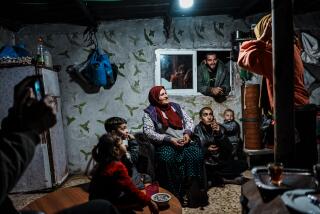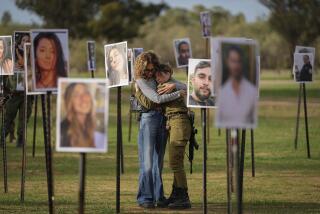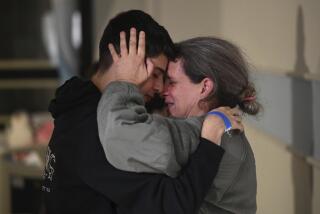Buses Take Hundreds of Westerners to Baghdad From Occupied Kuwait : Exodus: Hundreds more, including 25 Americans, are flown to Jordan after West agrees to use of Iraqi airliners.
BAGHDAD, Iraq — After a sweltering 13-hour journey, two convoys of buses arrived in Baghdad late Tuesday with hundreds of Western women and children from occupied Kuwait.
At the same time, three Iraqi Airways charter flights, financed by the U.S., British and West German governments, flew hundreds of additional refugees--Iraqi-Americans, Germans, Irish and other Europeans--from Baghdad to Jordan.
Earlier in the day, the West had given in to an Iraqi demand that the foreigners be flown out exclusively on aircraft of the state-run Iraqi airline.
On board the flights to Jordan were 25 of the estimated 100 American women and children stranded in Iraq. U.S. officials spent the day negotiating with Iraqi officials in an effort to charter flights for the estimated 1,400 American women and children still in Kuwait.
The first of the three planes that arrived in Amman from Baghdad reportedly carried 170 people, mostly Arabs and Asians but also an Englishwoman and her two children.
On the second plane were 135 West Germans and a number of New Zealanders, Irish and other Westerners, airport officials said.
The third flight carried, in addition to 25 Americans, 44 French, 36 British, four Australians and two Canadian women and children, airport officials said.
A U.S. official in Kuwait, asked why his government had not followed the British and German example and organized bus convoys to Baghdad, said:
“It’s a very arduous trip. To send hundreds . . . of women and children across the desert without men is cruel. So we’re trying to get them out by air.”
The bus convoys, the first official departures of foreigners from Kuwait since the Iraqi invasion on Aug. 2, apparently went smoothly.
The buses were given an official Iraqi army escort, and Western diplomats here praised the Iraqi government for improving the processing of the refugees, who were freed from detention a week ago by Iraqi President Saddam Hussein.
British officials who organized the larger of the bus convoys--seven vehicles carrying 306 women and children--said the Iraqis have become more cooperative.
“They’ve gotten more helpful,” British Ambassador Harold Walker said in an interview with Britain’s Independent Television News. “They’ve had time to get their bureaucratic procedures in line.”
But in London the Foreign Office condemned Baghdad for adding more Western male captives to the human shield Iraq is putting together in the hope of fending off attack by the U.S.-led multinational force massing in Saudi Arabia across the border from Iraqi-occupied Kuwait.
An additional 18 British men have been rounded up in recent days, bringing to 40 the number of British nationals now held at strategic installations, the Foreign Office said.
U.S. officials said they have no firm number for American men held in these circumstances--at power plants, airfields, refineries, factories, communications centers and fuel depots. U.S. officials said they know of only about a dozen and that they also know nothing of the whereabouts of about 500 American men who were in Kuwait city when the invasion took place.
According to Westerners arriving in Baghdad from Kuwait, the situation in the occupied emirate is worsening by the day.
“Clearly,” Ambassador Walker was quoted as saying, “things have been getting worse in Kuwait itself.”
Fay Sheraidah, an Iraqi-American among those who were flown out to Amman on Tuesday, described the past month, which she spent hiding in Kuwait, as “not very nice.” Sheraidah, who left her Iraqi husband here in Baghdad and, along with her daughter, headed for her home in North Carolina, said: “In Kuwait, we felt very uncomfortable. We were hiding inside for the last month.”
Other refugees, who asked not to be identified by name, said there has been a marked increase in sniping and firebomb attacks by the Kuwaiti resistance and that the Iraqi troops have stepped up door-to-door searches in an effort to add to the human shield.
Officially, Iraq describes as “guests” the more than 200 foreigners it has detained and the thousands of other foreign men who have been barred from leaving the country. President Bush and British Prime Minister Margaret Thatcher have called them hostages.
Increasingly, the men who are being left behind consider themselves hostages, and many say they are now afraid to leave their homes for fear of being caught in the human-shield roundups.
“We really have no problems other than that we can’t go out and we can’t go home,” Ray Herrod, an engineer from Houston, said in an interview with CBS-TV.
Herrod, one of 35 Americans at a U.S. diplomatic compound in Baghdad, said no one in the group ventures out except when it is absolutely necessary. Still, he said, Americans are probably safe “as long as we don’t get out and make too much of a spectacle of ourselves.”
Like other Americans, Herrod said he has no doubt about his status.
“Whether they call us hostages or detainees or guests, we still can’t leave,” he said. “And if I can’t leave, then that only leaves one word for me, and that’s hostage .”
Asked how his group feels about the women and children leaving Kuwait and Iraq, Herrod said: “To see them go home is a great pleasure for us all. We just wish we were with them.”
Some of the Iraqi-Americans had mixed emotions about leaving. Nithal George, who left the other night for San Francisco, where she will join her husband, left her parents behind.
“It is difficult,” she said. “I’m happy and I’m sad--happy because my husband is there, sad because I’m leaving my family and everybody here.”
For U.S. officials in Baghdad, who broke the impasse on departures Tuesday by accepting Iraq’s demand that no foreign airlines take part in the evacuation, the charter flights do not constitute a violation of the U.N. embargo against Iraq.
They conceded that the West is paying Iraq in hard currency for the charters and that this is prohibited under the embargo and President Bush’s executive order blockading Iraq. But they said there are provisions in both for humanitarian relief.
Still, some Western diplomats said the concession represents a symbolic victory for Iraq.
“They get their planes out, and now they can use them to get people and goods back in,” one said. “It’s also a matter of image and perception. They want to be seen as making this humanitarian gesture to the Western world, rather than sharing the glory with anyone else. But I’m not sure that, at the end of the day, it isn’t going to backfire somehow.”
More to Read
Sign up for Essential California
The most important California stories and recommendations in your inbox every morning.
You may occasionally receive promotional content from the Los Angeles Times.










